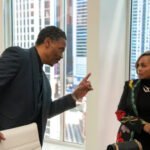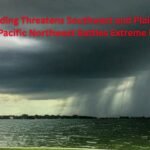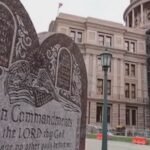The political climate in Washington, D.C., has reached a boiling point after an extraordinary move by former President Donald Trump to initiate what many are calling a “police takeover” of the nation’s capital. In a sharp public statement, Washington, D.C., Mayor Muriel Bowser called the action “unsettling and unprecedented,” warning that it sets a dangerous precedent for the balance of power between federal authority and local governance.
This move has ignited fierce debates across the political spectrum, raising questions about the limits of federal intervention, the autonomy of the District of Columbia, and the broader implications for civil liberties in the United States.
What Led to the Police Takeover?
The controversy erupted after reports emerged that federal law enforcement agencies, acting under the direct instruction of Donald Trump, deployed additional personnel into D.C. neighborhoods. While Trump framed the move as an effort to combat rising crime rates and restore order, critics argue that the step undermines the authority of the city’s elected officials.
The decision comes amid heightened concerns over crime statistics, political tensions in the run-up to the next election cycle, and ongoing disputes between Trump and the current Democratic leadership in D.C.
Mayor Bowser’s Response
Mayor Muriel Bowser did not mince words in her condemnation. Speaking at a press briefing, she called Trump’s actions “a blatant disregard for D.C.’s right to self-governance” and warned of long-term consequences if such interventions become normalized.
“This is not just about policing,” Bowser said. “This is about democracy, about the right of local communities to make decisions for themselves without federal overreach. What we are seeing is deeply unsettling and completely unprecedented.”
She further stressed that D.C. already works closely with federal law enforcement when necessary but insisted that unilateral deployments without local consent cross a constitutional line.
The Legal Grey Area of D.C. Authority
One of the complexities of this dispute lies in D.C.’s unique political status. As the nation’s capital, Washington is not a state and operates under a different governance structure. Congress has oversight authority over the District, and the federal government can, under certain conditions, intervene in local matters.
However, local leaders argue that Trump’s approach bypassed established legal channels and ignored the collaborative protocols typically followed in such cases.
Constitutional scholars are now weighing in, with some noting that while the federal government may have legal grounds, the political ramifications could be severe.
Supporters of Trump’s Move
Supporters of Trump’s intervention argue that drastic times call for drastic measures. They point to rising reports of violent crime in parts of the city and claim that the local government has failed to protect its residents.
Prominent Trump allies have praised the move, framing it as a decisive act of leadership. They argue that federal intervention is justified when public safety is at stake, especially in a city that hosts critical federal institutions.
Some conservative commentators have also noted that D.C. residents themselves might welcome stronger policing, though public opinion polls on the matter remain mixed.
Critics Warn of Dangerous Precedent
Opponents see a darker side to the move. Civil rights groups and political analysts warn that using federal law enforcement in this way could erode democratic norms and pave the way for political leaders to deploy security forces against local governments for partisan gain.
“If this becomes acceptable, what stops a president from taking over police functions in any city that doesn’t align with their politics?” asked one constitutional law professor.
Activists fear that such interventions could also have a chilling effect on free speech and public protests, especially given D.C.’s history as a center for political demonstrations.
The Historical Context
While federal deployments in Washington, D.C., are not unheard of, they are usually tied to national emergencies, large-scale protests, or security threats. The most notable recent example was during the 2020 George Floyd protests, when federal officers were brought in, leading to widespread criticism over the aggressive tactics used.
Trump’s current move is different in that it was initiated outside of a declared emergency and appears to be targeted more at general law enforcement rather than specific security threats.
This deviation from precedent is at the core of Mayor Bowser’s concern, as it suggests a lower threshold for federal involvement in local affairs.
Political Repercussions
The incident is already shaping up to be a flashpoint issue in the broader national political debate. For Democrats, it’s a rallying cry for D.C. statehood and greater autonomy. For Republicans aligned with Trump, it’s an example of “getting tough on crime” and bypassing what they see as ineffective local leadership.
It could also have electoral consequences in the upcoming presidential race. If Trump remains a candidate, his handling of D.C. could be framed either as a bold security measure or an authoritarian overreach, depending on the audience.
Public Reaction
Initial public reaction in D.C. has been mixed:
- Supporters of the takeover cite safety concerns and welcome increased patrols.
- Opponents view it as political theater and an attack on local governance.
Social media has been flooded with personal accounts, videos of federal officers on city streets, and heated debates about what this means for democracy in the United States.
Potential Next Steps
Mayor Bowser has indicated that the D.C. government is exploring legal challenges to Trump’s action, possibly taking the matter to federal court. Additionally, members of Congress sympathetic to D.C.’s cause have promised to investigate the circumstances of the deployment.
If legal avenues fail, political pressure and public opinion may become the primary tools for opposing the move. Meanwhile, federal law enforcement agencies remain on the ground, creating ongoing tension between city and federal officials.
The Bigger Picture
This standoff is more than just a local dispute—it’s a test case for the limits of presidential authority over local policing. It also revives long-standing debates over whether Washington, D.C., should be granted statehood to protect it from unilateral federal control.
For now, residents of the capital find themselves at the center of a national constitutional drama, one that could reshape the relationship between cities and the federal government for years to come.
Final Verdict
Mayor Bowser’s characterization of Trump’s police takeover as “unsettling and unprecedented” captures the gravity of the moment. Whether one views the move as a necessary step to address crime or a dangerous abuse of power, its impact will be felt far beyond the streets of Washington, D.C.
As the legal and political battles unfold, this episode will likely be remembered as a defining moment in the ongoing struggle over local autonomy, federal authority, and the future of democratic governance in America.











